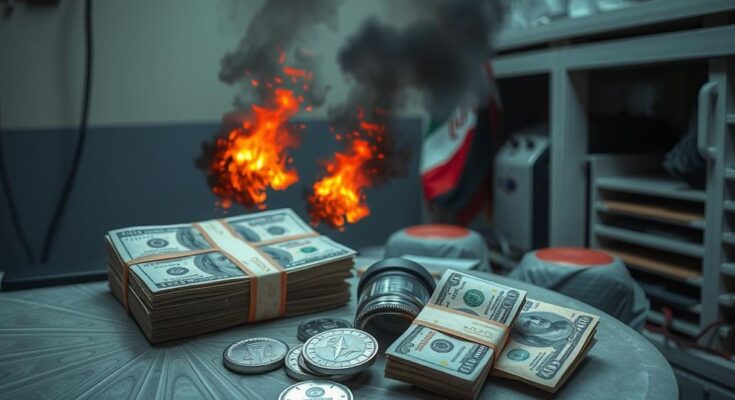Iran is grappling with widespread public discontent fueled by economic challenges, including inflation and power outages. Researcher Benny Sabti emphasizes the dissatisfaction over government spending on foreign conflicts, notably Syria. Recent events have given citizens hope for change, with potential uprisings looming as living conditions worsen and inflation escalates. The Iranian government’s mixed responses to external threats further compound its vulnerabilities, suggesting 2023 may be a pivotal year for the regime.
The Iranian populace is experiencing escalating dissatisfaction due to severe economic challenges, which encompass significant inflation and frequent power outages. Researcher Benny Sabti from the Institute for National Security Studies highlighted the public’s indignation towards governmental mismanagement, particularly concerning the estimated $50 billion allocated to Syrian involvement since 2000, funds that many believe have been squandered. The societal discontent is underscored by reports showcasing an alarming rise in unemployment rates and daily life disruptions due to energy shortages.
Sabti elaborated that recent geopolitical developments, such as setbacks for Hamas, have sparked a flicker of hope among Iranians, with 80% reportedly opposing the current regime. This dissatisfaction was evident in dismal electoral participation during the latest presidential elections. Moreover, Sabti noted that persistent energy deficits have disproportionately impacted industrial operations and living conditions, leading to distressing pollution levels and extensive power outages across the nation.
Despite the sporadic nature of worker protests, there exists a palpable fear within the regime regarding potential uprisings. The regime’s acknowledgment of its vulnerabilities has paradoxically manifested through a recently conducted protest-response drill, reflecting an anticipation of unrest. Furthermore, mixed messages emanate from the government, with threats against Israel juxtaposed against admissions of defeat in recent military endeavors.
Sabti pointed out the dire economic ramifications of inflation, particularly the steep depreciation of the rial against the dollar, which complicates importation processes. He posited that although many citizens are willing to persevere, there exists a collective hope for international intervention to facilitate regime change. The mention of a powerful figure’s potential return, viewed favorably by the public, encapsulates their desire for substantial political transformation. According to Sabti, the convergence of these factors points to 2023 being a pivotal year for Iran as the regime grapples with its aspirations amidst daunting challenges around nuclear capabilities.
The article discusses the current socio-economic conditions in Iran, reflecting the ongoing public unrest stemming from economic hardships. With the Iranian government allocating substantial funds to foreign conflicts, particularly in Syria, citizens are increasingly frustrated with their government’s failures. This dissatisfaction comes amidst severe inflation and systematic power shortages, leading to deteriorating living conditions. The juxtaposition of internal discord and external threats creates a complex landscape for the Iranian regime and its populace.
In summary, Iran is currently facing significant internal strife due to economic mismanagement and a populace that is increasingly dissatisfied with the regime. The allocation of funds towards foreign ventures rather than domestic stability has fueled public resentment. Rising inflation, unemployment, and civil unrest point to a delicate situation for Iran’s leadership, indicating that 2023 may prove to be a watershed year for the nation as it navigates these profound challenges.
Original Source: www.jpost.com




